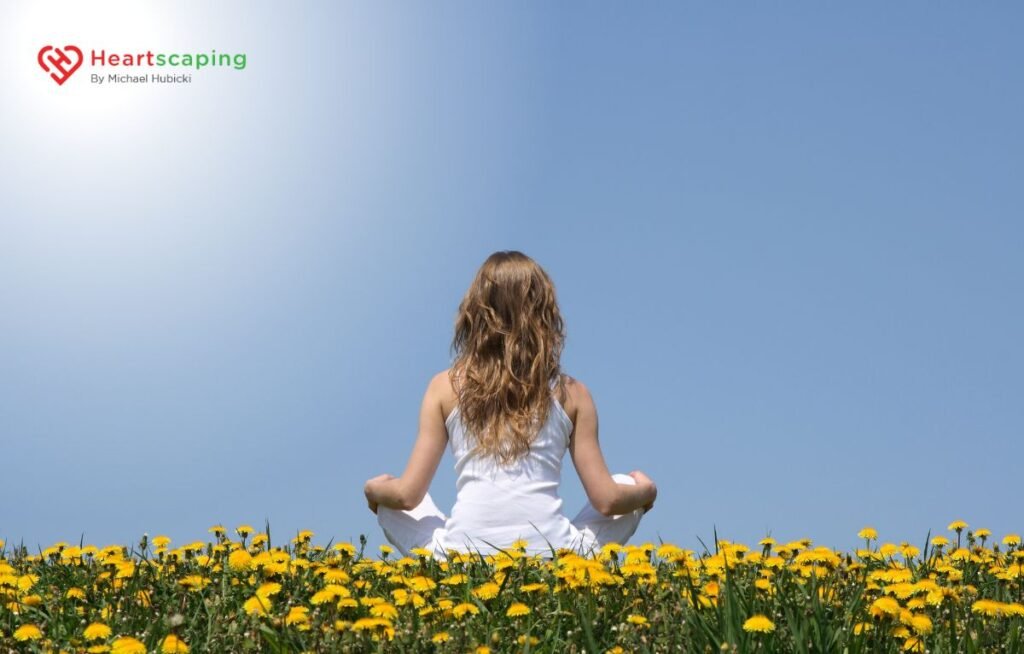Unlock Your Inner CEO Embrace the Entrepreneurial Mindset Are you...
Read More
Mindfulness vs. Meditation: Unraveling the Threads of Inner Peace
- admin_heartscaping
- November 13, 2023
- 9:37 am
In the pursuit of inner peace and mental well-being, mindfulness and meditation emerge as stalwarts, offering distinct yet interconnected paths to a calmer mind.
While often used interchangeably, these practices hold unique attributes that contribute to the cultivation of a harmonious inner landscape.
Let’s untangle the threads of mindfulness and meditation, understanding their differences and exploring how they intersect in the journey toward tranquility.
What is mindfulness?
Mindfulness is the practice of being fully present in the moment, observing and acknowledging thoughts, sensations, and surroundings without judgment.
It involves consciously focusing on the “now,” embracing each experience with full attention.
Whether it’s savoring the taste of food, feeling the sensation of each breath, or being fully engaged in an activity, mindfulness encourages awareness and acceptance of the present moment.
What is meditation?
Meditation, on the other hand, is a more structured practice aimed at achieving mental clarity, emotional calmness, and heightened self-awareness.
It involves various techniques—such as focused breathing, visualization, or chanting—to attain a state of deep relaxation and mental silence.
Meditation often occurs in a seated position, focusing on quieting the mind and delving into a deeper level of consciousness.
Understanding the Harmony and Differences
While mindfulness and meditation may appear distinct, they intertwine beautifully.
Mindfulness can be seen as a way of living, a continuous state of being aware, while meditation is a specific practice or exercise within this broader concept.
Mindfulness serves as the foundation, fostering present-moment awareness in everyday life, while meditation acts as a tool to deepen and refine this state of awareness.
Benefits and Applications
Both mindfulness and meditation offer an array of benefits. Mindfulness aids in reducing stress, improving focus, and enhancing emotional regulation.
It’s often integrated into daily activities, making it a practical and accessible practice.
Meditation, on the other hand, dives deeper into self-reflection and relaxation, fostering a sense of inner calm and promoting overall well-being.
Incorporating Both into Daily Life
Incorporating mindfulness and meditation into daily life can significantly contribute to mental wellness.
Mindfulness practices can be as simple as mindful breathing exercises or mindful walking, seamlessly integrated into daily routines.
Meditation, while initially requiring dedicated time, can become a daily ritual, fostering a deeper connection with oneself and the present moment.
Exploring the Personal Journey
Each individual’s journey with mindfulness and meditation is deeply personal.
Some may find solace in the simplicity of mindfulness during routine tasks, while others may thrive in the structured practice of meditation.
Experimenting with various techniques and finding what resonates personally is key to deriving the maximum benefit.
Harmony in Diversity
The beauty lies in the harmony and diversity of these practices.
While mindfulness and meditation differ in their approaches, they both converge in their goal: fostering a deeper understanding of oneself, cultivating peace, and promoting mental and emotional well-being.
In the tapestry of mindfulness and meditation, each thread weaves a unique pattern, contributing to the masterpiece of inner peace.
Embracing the distinct yet complementary nature of these practices can lead to a balanced and harmonious existence.
Life Coach vs. Therapist: Find the Support That’s Perfect for YOU
Life Coach vs. Therapist: Find the Support That’s Perfect for...
Read MoreUnderstanding Yourself for Deeper Connection
Understanding Yourself for Deeper Connection How well do you understand...
Read MoreUnlock the Magic of a Positive Mindset
Unlock the Magic of a Positive Mindset Life throws curveballs....
Read More




